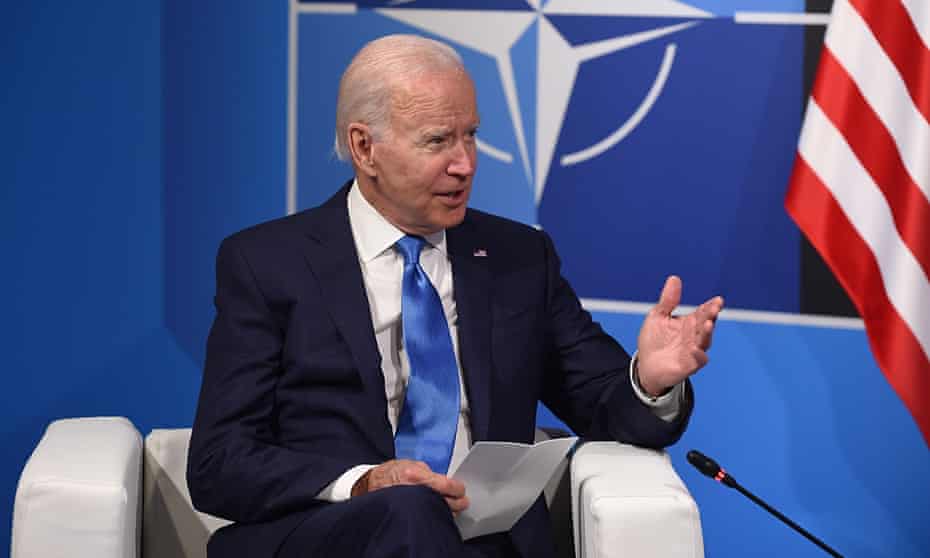President says ‘US and its allies are going to step up’ as he arrives for summit of Nato leaders in Madrid

Joe Biden has announced that the US will increase its military forces across Europe with more land, sea and air deployments, as he gathered with Nato leaders for a two-day summit in response to Russia’s invasion of Ukraine.
Arriving at the meeting in Madrid, the US president announced the stationing of a brigade of 3,000 combat troops in Romania, two squadrons of F-35 fighters in the UK and two navy destroyers in Spain.
“The US and its allies are going to step up. We’re stepping up. We’re proving that Nato is more needed now than it ever has been,” Biden said in a short statement he read out before the first summit meeting began.
Biden’s announcement is expected to be followed by further commitments by Nato members to a strengthening of forces on the alliance’s eastern flank, which was being discussed by Nato leaders on Wednesday morning.
The morning meeting heard an address from Ukraine’s president, Volodymyr Zelenskiy, in which he called on Nato members to supply more advanced weaponry, particularly artillery, to help “Ukraine end this war by winning on the battlefield now”.
He also warned that Kyiv needed financial support to deal with the costs of fighting Russia. “We need about $5bn a month,” Zelenskiy said, arguing that his country was fighting a country identified as Nato’s most serious threat. “We are deterring Russia from destroying us and from destroying you,” he said.
Britain confirmed that it would increase its commitment to a Nato battlegroup in Estonia from 1,700 by about 1,000, although the extra forces will be based in the UK, earmarked to deploy to the country at short notice if needed.
In total, eight frontline Nato battlegroups stretching from Estonia to Bulgaria, once designed to act as small initial defence force, are expected to be increased in size to a brigade level of 3,000 to 5,000 troops.
Different Nato members will contribute to each as part of radical change in the alliance’s military posture. Germany has already said it will increase its existing commitment to Lithuania to the size of a brigade.
The US president also said the US fifth army corps would establish a permanent base in Poland, extra troops would be committed to the Baltic states and extra air defence systems would be stationed in Germany and Italy.
It was, Biden said, a response to Russian aggression, adding: “Together with our allies, we are going make sure Nato is ready to meet threats across every domain, land, air and in the sea”, which came “at a moment when Putin has shattered peace in Europe and the very tenets of rules-based order”.
The US sent a further 20,000 troops to Europe earlier this year, taking the total based across the continent to over 100,000. Wednesday’s announcements come on top of that and Biden said the US would “continue to our adjust our posture” if necessary.
Nato’s new defence plans mean that 300,000 troops would be placed at high readiness to deter any Russian attack. The forces will be available at a few days or weeks’ notice to be sent into the frontline if necessary.
Later, Biden also thanked his Turkish counterpart, Recep Tayyip Erdoğan, for reaching a deal with Finland and Sweden to allow the Nordic countries to end decades of neutrality and join Nato, at a bilateral meeting between the leaders.
US officials added that they now supported Turkey’s desire to buy F-16 fighter jets and upgrade its air force. “The US Department of Defense fully supports Turkey’s modernisation plans,” Celeste Wallander, assistant secretary of defence for international security affairs, said.
The leaders attending the summit signed off on a new Nato strategic concept, the first time the alliance has revised its vision statement since 2010. It formally recognised that Russia poses “the most significant and direct threat to allies’ security”.
The 2010 summit where the old document was agreed was attended by Russia’s then president, Dmitri Medvedev, Stoltenberg recalled. “We agreed that Russia is a strategic partner for Nato and we had meetings with Russia at the Nato summit. And of course, this will not be the case now.”
The new document also referred to China for the first time, warning that Beijing’s “stated ambitions and coercive policies challenge our interests, security and values” and that a “deepening strategic partnership” with Russia, and the two countries’ attempts to undercut the rules-based international order, “run counter to our values and interests”.

Leave A Comment